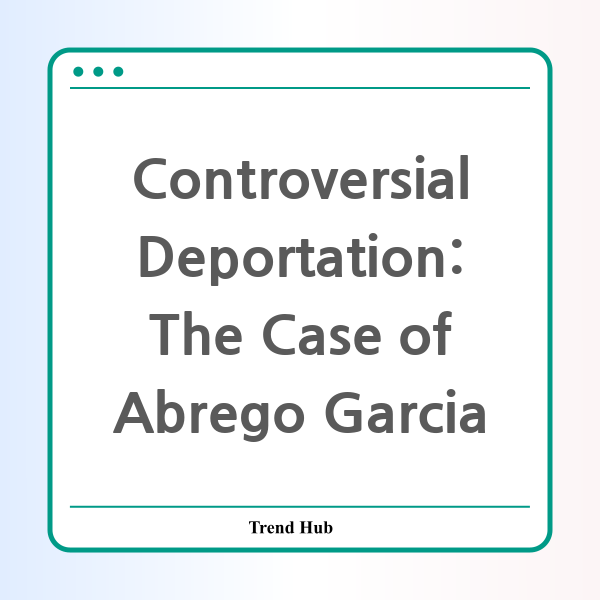* This website participates in the Amazon Affiliate Program and earns from qualifying purchases.

In a contentious climate marked by immigration debates, the case of Kilmar Abrego Garcia has stirred significant controversy. Recently deported to El Salvador, Abrego Garcia has been labeled by the Trump administration as a violent gang member, a characterization that has incited public outrage and raised questions about due process and the administration’s tactics.
Abrego Garcia's journey began in 2012 when he entered the United States illegally, fleeing threats from gangs in his home country. His attempts to seek refuge have now turned into a nightmare, leaving him facing allegations from the government that he is affiliated with the infamous MS-13 gang. However, his family and legal representatives vehemently deny these claims, arguing that the administration is mischaracterizing his past interactions with law enforcement to justify his deportation.
What has fueled the fire surrounding Abrego Garcia's case is the release of documents by the government, which they claim illustrate his supposed gang ties. These documents recount a 2019 incident in which Abrego Garcia, along with others, attracted police attention outside a Maryland Home Depot. While two men were recognized as having gang affiliations, Abrego Garcia was not charged with any crime, leading to questions about the validity of the accusations against him.
Furthermore, a protective order was filed by his wife in 2021, alleging domestic violence, but later, she chose not to pursue further legal action, stating that they had resolved their issues. This has sparked debate on whether isolated incidents should be used to paint a picture of someone’s character or threats they may pose, especially considering the context of their relationship.
Democratic Sen. Chris Van Hollen took a personal interest in the case, traveling to El Salvador to advocate for Abrego Garcia’s return to the United States. Van Hollen has described him as having been “illegally abducted,” emphasizing the lack of due process afforded to Abrego Garcia in the deportation proceedings. This high-profile involvement illustrates the political stakes involved in this case and the broader implications for immigration policy.
The situation raises critical issues regarding how the government handles claims of gang affiliation during deportation hearings. According to experts, the burden of proof often falls heavily on the accused when it comes to discrediting accusations, which can lead to biased outcomes where immigrants are detained based on tenuous evidence.
The public discussion around Abrego Garcia's deportation is not merely about one individual's fate but reflects the broader narrative of immigration in the United States. Critics argue that the tactics employed by the Trump administration to portray him as a dangerous criminal serve more as a political tool than a fair legal proceeding. The characterization of Abrego Garcia as a gang member without solid evidence raises serious ethical questions about immigration enforcement practices.
In light of all this, one must consider: at what point do accusations become overreach? And how do we ensure fair treatment for individuals facing deportation? As Abrego Garcia’s case continues to unfold, it not only impacts his life but also highlights the urgent need for reform in the way immigration cases are handled, especially regarding allegations of gang affiliation.
This situation is a crucial reminder of the complexities involved in immigration law and the human stories behind the headlines. The intersection of law, personal testimony, and government action calls for careful scrutiny and a humane approach to immigration policies moving forward.
* This website participates in the Amazon Affiliate Program and earns from qualifying purchases.